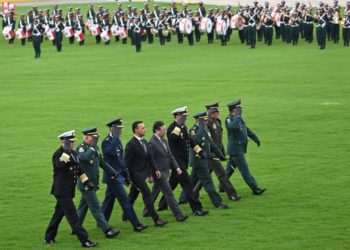Russia’s intensifying incursions into European airspace are often described as acts of hybrid war. The implication is that while conventional war rages in Ukraine, with the Russian military directly targeting Ukrainian civilians, Russia’s war in Europe remains in a gray zone. It is psychological shadowboxing intended to degrade Europe’s motivation and resolve.
But this distinction is misleading. It is better to think of the war in Ukraine as a single war, with different levels of participation. If nothing else, Russia’s airspace violations show that Moscow makes no sharp distinction between Europe and Ukraine. Analysts must abandon this distinction if they hope to understand Russia’s thinking, and European states must abandon this distinction if they hope to gain lasting advantage in the war.
As the United States recedes from the conflict, scaling back direct military support for Ukraine, Europe is already stepping forward, investing heavily in the defense of Ukraine. Europe’s oft stated goal of a Ukraine integrated into European political and security structures is anathema to Russia. Yet, despite this, Europe is still trying to keep the war at arm’s length.
Going forward, Europeans should dispense with the crutch of hybrid war. When they do, they will see that Europe’s position vis-à-vis Ukraine may be more robust than Europeans might think, if more intertwined with the war than they might wish. In a long confrontation with Russia, Europe holds many of the best cards.
Russia’s war against Ukraine has always been about more than Ukrainian territory, Ukrainian language laws, or the status of “ethnic Russians” in Ukraine. Fundamental to Russia is Ukraine’s place in Europe. Prior to the 2014 Maidan Revolution, Moscow had a loyal client in Viktor Yanukovych, Ukraine’s president at the time. In Crimea, Ukraine leased the naval port of Sevastopol to Russia. Amenable to doing business with Russia, Ukraine was not on a path to joining NATO. The sudden loss of this client prompted the annexation of Crimea and a Russian incursion into eastern Ukraine. Russia would retain control of Crimea and a portion of eastern Ukraine after 2014, while normalizing relations with Europe. In Moscow, the hope was to go back to the halcyon pre-Maidan days. This never happened.
Russia conducted its 2022 invasion of Ukraine very much with Europe in mind. Had Ukraine fallen bloodlessly into Russia’s lap, as Russia’s phantasmagoric war plans likely anticipated, Europe might have been frightened into a new relationship with Russia. After all, Europe did not break relations with Russia over the annexation of Crimea and the Russian attacks on eastern Ukraine.
But Russia’s 2022 invasion failed, leaving Russian President Vladimir Putin mired in a forever war. Russia does not have the military capacity to win (whatever winning might mean). Nor does it have any kind of exit strategy. Even worse, most of Europe rallied to Ukraine’s side. Russia’s stalwart European advocate, Germany, has become its bitter enemy.
Putin’s Russia does not regard defeat in Ukraine as an option. The war must go on until two acceptable lines can be drawn, one through Ukraine itself and the other between Russia and Europe. Europe is becoming an armed and hostile camp from Russia’s point of view. Thus, Europe’s efforts to integrate Ukraine will have to be countered with sustained military force, either to get Europeans to retreat from their efforts or, if that proves impossible, to impose costs on a Europe for its unbreakable hostility.
With Europe (and Germany in particular) pouring money into its military partnership with Ukraine, Moscow has concluded that it cannot isolate Europe from the war. As a result, it is trying to move the line dividing Ukraine as far west as possible by harassing Europe.
Russia is likely to increase its efforts to menace Europe directly. This is Russia’s method of amassing leverage against European states. It is not particularly expensive, imposing the dilemma of escalation on Europe. This is particularly effective at a time when the U.S. commitment to European security is uncertain, and it plays on Europe’s long-standing challenge of integrating its foreign and security policy. The European Union has too few military means, whereas NATO is led by a superpower that wants to reduce its military footprint in Europe. Militarily, Europe is less than a confederation, which is a problem when confronting a single nation-state led by a determined dictator.
Its many challenges do not at all mean that Europe is doomed to fail. Rather, it is Moscow’s efforts to escalate that will likely fall short. As it did in Ukraine in 2022, Russia has picked a fight with Europe that it is too small to win. Russia can impose costs. It cannot dictate outcomes.
Europe will not be able to stop all Russian sabotage, overflights, and cyberattacks. There are practical solutions to each of these three challenges, some of which will be military. For example, Europeans should find an inexpensive way of shooting down the Russian drones that materialize in European airspace. Some solutions will rely on Europeans’ intelligence services: detecting Russian saboteurs and developing tools to retaliate quietly against dangerous Russian activity. Others will be found in better policing. Dealing with irregular warfare, like dealing with terrorism, is an imperfect science. Failures should demand critical reassessments, but these failures, when they come, should not be the occasion for hysterical self-criticism or for overly generous assessments of Russian power. They should be accepted calmly. They are the inevitable byproduct of this sprawling war.
The Kremlin’s expansion of the war into Europe furnishes us with a key insight into Russian thinking about Ukraine and Europe. In Europe, Russia has largely given up on persuasion as a foreign-policy tool, even if it has not given up on trying to persuade Washington.
Russia’s brutal assaults on civilian life in Ukraine indicate that Moscow has lost the Ukrainian public, which will not swing back toward Russia. Yet Russia does not have the military power to impose its will on unoccupied Ukraine, which is roughly 80 percent of the country. Here, its war has hit a hard limit. One forgets that Russia’s initial war plan was rooted in a political argument—that the Ukrainian government was illegitimate, that millions upon millions of Ukrainians wished to live in Russia or were in fact Russians, that the West was the decadent doppelganger to a vibrant Russia, meaning that traditionalist Ukrainians, given the choice, would choose Russia. Now, Russia shows only the boot to Ukraine, proof positive of all that has gone wrong for Russia.
In Europe, Russia has also opted for intimidation rather than persuasion. Putin cannot ignore the half trillion euros in spending to which Germany has committed itself. He must find ways of pushing back. Whatever the military advantages this pushback may bring, it is politically debilitating for Russia, which once had networks of affiliation across the continent. Former German Chancellor Gerhard Schröder left office in 2005 and became a lobbyist of sorts for the Russian government. That would be unthinkable today. Even the European governments that could be characterized as outliers on Russia—such as Hungary, Slovakia, and Italy—cannot effectively oppose Europe’s growing commitment to Ukraine. As goes Germany, so goes Europe, and Germany, under Chancellor Friedrich Merz, has been transformed by Russia’s war.
Europe enjoys many asymmetric advantages over a belligerent Russia. Irregular warfare will not enable Russia to take and hold territory in Europe. It cannot be easily translated into the currency of conventional war. Irregular warfare will not induce Europeans to surrender in Ukraine, and in this war of attrition, Europe has the better long-term position by far. True, Europe does not excel at mobilizing military resources quickly. The parlous state of Ukraine’s air defenses will make for a difficult winter, and Russia is mass producing drones at an alarming rate.
But the disparities in economic might are overwhelming. The aggregate GDP of the EU is some 20 trillion dollars; Russia’s is a bit more than 2 trillion. These numbers do not guarantee Ukrainian victory. But they do make a European defeat in this drawn-out struggle very unlikely. A Russia that cannot persuade will not have the military strength necessary to coerce Europe into accepting its rules, a conundrum that cannot be avoided by sending drones into European air space.
Merz has recently suggested that Europe is neither at peace nor at war. European leaders and populations would be better off being more candid: Ukraine’s war is Europe’s war. It is a war over whether Ukraine is part of Europe. If you believe that it is, as most European leaders say they do, then you believe the war per se has already come to the continent. The sooner that Europeans accept this, the better they can appreciate and deploy the resources at their disposal.
The post Europe Is At War appeared first on Foreign Policy.




